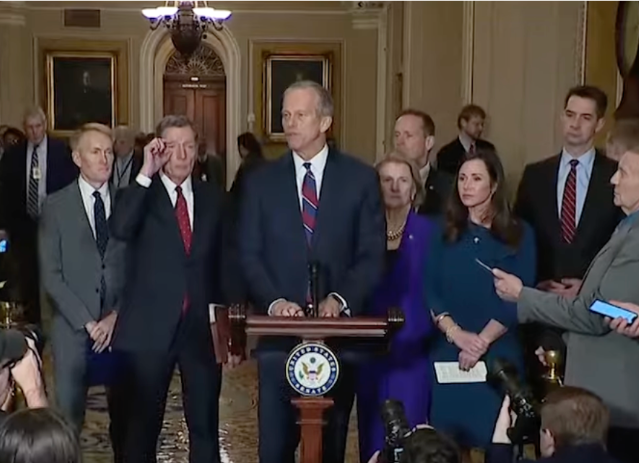Breaking News
Will The Laken-Riley Act Finally Solve The Illegal Immigration Crisis?

Among the priority bills awaiting action by incoming President Donald Trump is the Laken-Riley Act, a sweeping piece of immigration legislation that has sparked intense debate. Named after a Georgia nursing student tragically murdered by an undocumented immigrant, the bill aims to overhaul immigration enforcement. While supporters argue it enhances public safety, critics warn it infringes on due process and strains resources.
The Laken-Riley Act has successfully passed the House of Representatives with strong Republican backing and notable bipartisan support from 48 Democrats. It is now under Senate consideration, where debate over proposed amendments is ongoing. While the bill has cleared its initial hurdles, significant opposition remains over constitutional concerns and logistical challenges. If passed in its current form, the bill will move to President Trump’s desk, where it’s expected to be signed into law. However, the act's future depends on how the Senate addresses key controversies during its final deliberations.
Sweeping Changes to U.S. Immigration Policy
The Laken-Riley Act mandates detention for undocumented immigrants accused of theft or related crimes, even if the charges originate abroad. This dramatic expansion overrides current enforcement priorities focusing on national security and public safety threats. Critics caution that such changes could overwhelm immigration systems and disregard due process by eliminating safeguards like bond hearings.
The act also grants states the right to sue federal agencies over immigration decisions. Empowering state attorneys general to challenge policies and decisions shifts federal authority to state governments. Proponents claim this ensures accountability and addresses localized impacts of federal immigration policy. However, detractors warn that it could lead to fragmented enforcement, legal chaos, and strained diplomatic relations.
The Financial and Logistical Challenges of Implementing the Laken-Riley Act
Immigration and Customs Enforcement (ICE) estimates the act will require $83 billion over three years. This funding would expand detention facilities, deportation flights, and personnel by tens of thousands.
Without these resources, ICE warns it might release detainees due to capacity constraints. While advocates argue that investment is essential to uphold the rule of law, critics question whether it addresses the root causes of immigration challenges or simply exacerbates existing issues.
The Role of Ken Paxton and States’ Influence
A particularly contentious aspect is the potential appointment of Texas Attorney General Ken Paxton to oversee deportation decisions. This would give a single state official sweeping authority over federal immigration policy, raising concerns about constitutional overreach.
Paxton’s history of opposing federal immigration actions, such as efforts to dismantle Deferred Action for Childhood Arrivals (DACA), amplifies fears of bias in enforcement.
Provisions allowing states to block visas for nationals of countries refusing to accept deportees also risk disrupting U.S. foreign policy. Critics argue that granting states this level of control undermines federal supremacy and international cooperation on immigration.
Broader Implications and Controversy of the Laken-Riley Act
The Laken-Riley Act has also sparked broad opposition. Legal experts highlight conflicts with Fifth Amendment protections, including mandatory detention without bond hearings. Immigration advocates argue that the bill shifts resources from targeting violent offenders to minor infractions. Additionally, empowering state attorneys general to dictate federal immigration policy sets a concerning precedent that can potentially lead to fragmented and chaotic enforcement.
If passed, the act would fundamentally reshape U.S. immigration policy by prioritizing punitive measures over systemic reform. Supporters see it as addressing public safety concerns, while critics contend it neglects issues like modernizing asylum processes and tackling root causes of migration. As the Senate debates amendments, the act’s future remains uncertain, underscoring the polarized nature of U.S. immigration politics.
Do you support the Laken-Riley Act as a solution to the problem of illegal immigration? Tell us what you think!

1 Comment
Again, this report is biased and does not tell all the truth. The 5th amendment of the USA Constitution applies to citizens, so illegal immigrants do not have 5th amendment rights!!!
Most of the immigrant laws that this article supports, are themselves illegal laws! They are not constitutional to begin with, which means this new act will help return the immigration system to more of what the original laws intended.